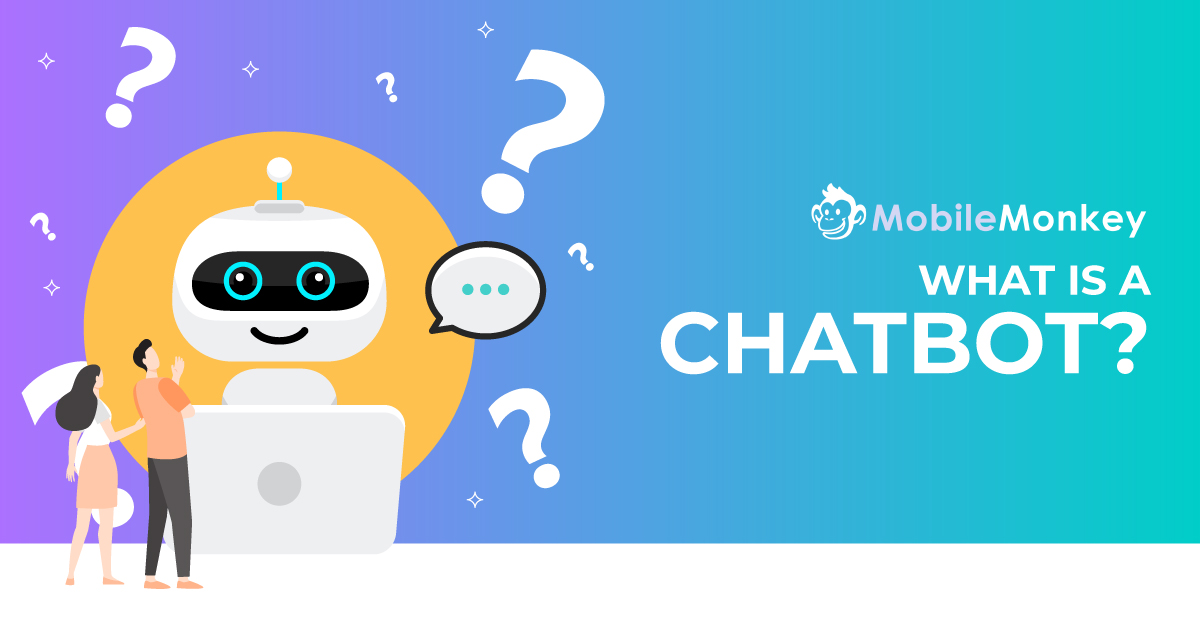Somewhat recently, I was out with a friend discussing work and when I told him about Customers.ai he asked me, “What is a chatbot?”
In 2020, I was a little surprised that my friend didn’t know what a chatbot was. So I did what any reasonable person would do and took a poll from everyone in the establishment. Totally normal, right?
The result: Roughly half of the patrons I asked had any idea what a chatbot was.
So, let’s make sure everyone knows exactly what a chatbot is!
In this article, we’ll cover the following topics to leave no doubt that you’ll be able to explain what a chatbot is to anyone who asks:
Let’s get straight to it! What on earth is a chatbot?
Join Today’s Webinar with Larry Kim!
Or Register for the Free Replay
Learn all about NEW 100% Meta-Approved Automation Tools from Customers.ai with a spotlight on features to 10X Instagram & Facebook Engagement and turn social media into a revenue driver for your business.
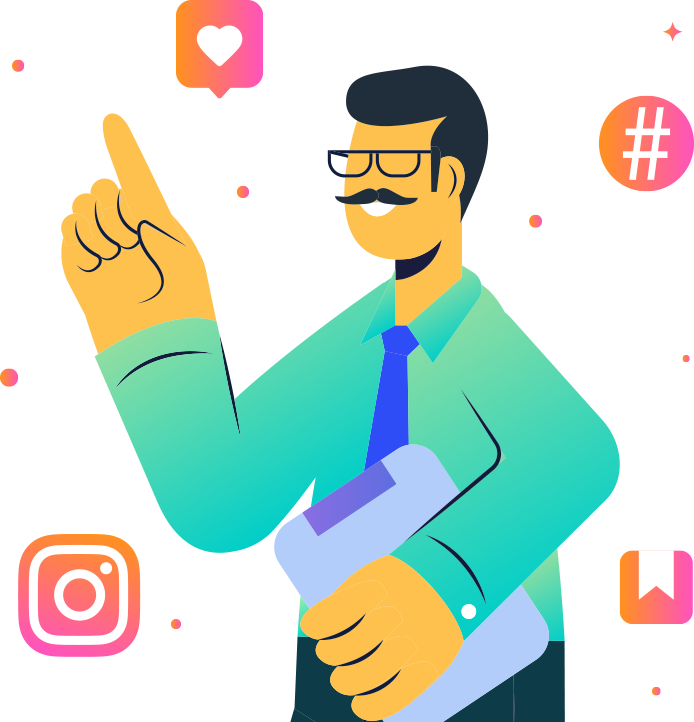
What is a Chatbot and How Does it Work?
In order to define chatbot accurately, let’s start with a textbook definition. Then, we can move onto what a chatbot for business is, and how chatbots work.
Chatbot definition
So, what is a chatbot?
Here’s the definition of ‘chatbot’ according to Dictionary.com: a chatbot is a computer program in the form of a virtual email correspondent that can reply to messages from computer users.
Okay, now that we have the not incredibly exciting definition of what is a chatbot out of the way, here’s an alternative definition that’s more suitable for business people and marketing professionals.
Also known as “conversational agents,” chatbots are software applications that mimic written or spoken human speech for the purposes of simulating a conversation or interaction with a real person.
You’ve used a chatbot before. I almost guarantee it.
Look in the lower right corner of your browser. That’s a chatbot.
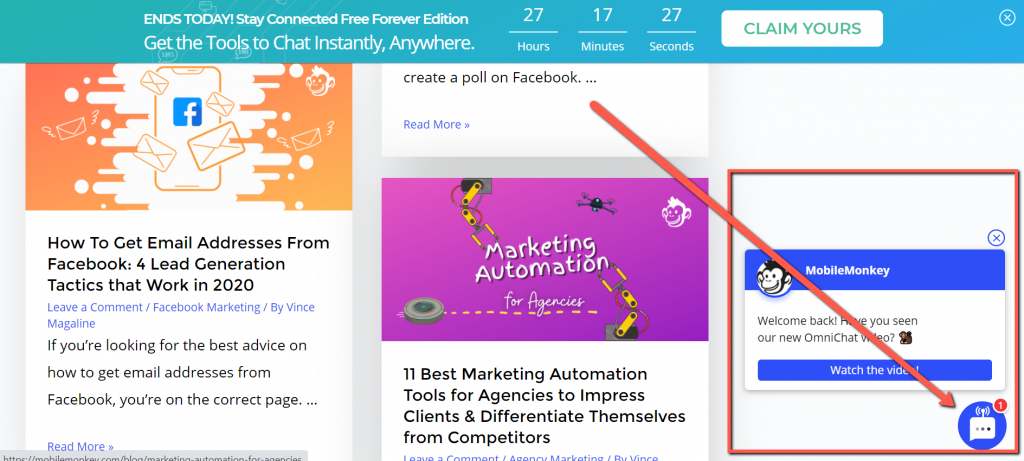
There are two main ways chatbots are offered to visitors:
- Web-based applications: Software that allows users to interact through a web browser interface.
- Standalone apps: An application that runs on a device and doesn’t require anything else to be functional. All the logic is built into the app, so it doesn’t need an internet connection or any other services installed.
Today, chatbots are used most commonly in the customer service space, assuming roles traditionally performed by living, breathing human beings such as Tier-1 support operatives and customer satisfaction reps.
How do chatbots work?
Now that we know what a chat is, we should understand how a chatbot works and what a chatbot used for.
How do chatbots work?
From a high-level view, it looks like this:
- A user communicates with a computer program via text, voice, or even a smile or a wave.
- The computer program responds to what you’ve said based on how it has been programmed. Perhaps you typed “pricing” and the chatbot has been programmed to serve up information about your product costs.
The idea is fairly simple.

Chatbots can take different forms, depending on how they’re used.
For example, some chatbots use AI (artificial intelligence) and NLP (natural language processing) to simulate human conversation.
AI technology allows these chatbots to better understand, adapt to, and respond to a conversation.
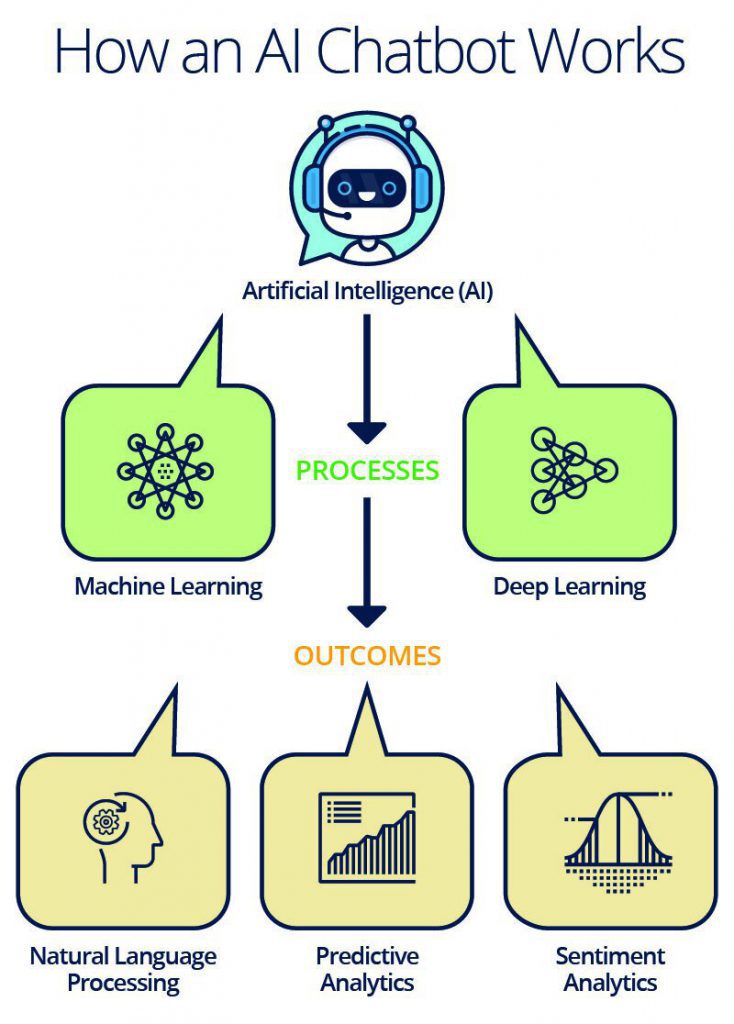
Chatbots with advanced technology like NLP are increasingly useful. But for the day-to-day use of marketing, sales, and customer service, text-based chatbots are perfect.
Chatbots also differ according to where and how you interact with it.
For example, you can build chatbots to work on Skype, Slack, WhatsApp, Messenger for Facebook and Instagram, as well as most other channels where messaging is permitted.
What are Chatbots Used For?
How to use a chatbot for business
For business, it’s important to know when and where to use chatbots to your advantage.
Chatbot software for business is most commonly used for marketing, customer support, and sales.
Plus, chatbots can be used across different marketing channels, such as Messenger for Facebook and Instagram, SMS text messaging, and live chat for your website.
What is a Messenger chatbot?
Facebook Messenger marketing solutions for business include a range of tools and platforms to create chatbot virtual assistants for marketing, sales, and customer support on the most popular chat application in the U.S.
In fact, Facebook Messenger is the second most used chat application in the world, with over 1.5 billion active monthly users.
So, what is a Messenger chatbot?
Facebook Messenger chatbots are artificial intelligence computer characters that can hold conversations with humans from within the Facebook Messenger chat application.
Businesses can develop inexpensive, feature-rich automated chat solutions for customer communication ranging from customer service to entertainment to marketing and sales automation.
These solutions run on the end user’s chat marketing mobile app, desktop, or on their business website for users with a Facebook Messenger login.
Facebook Messenger chatbots are a scalable and affordable solution that can help businesses operate at a high level on par with large scale systems.
Advantages of Facebook Messenger chatbots include the fact that there are over 1.5 billion active global users of Facebook Messenger.
Customers report instantaneity and convenience of communicating with service providers from the chat applications they already have as their top two reasons for favoring chat for customer service communications.
This is followed by the benefit of retaining a persistent chat history, another unique advantage of chatbots in Facebook Messenger.
Business use cases for Facebook Messenger
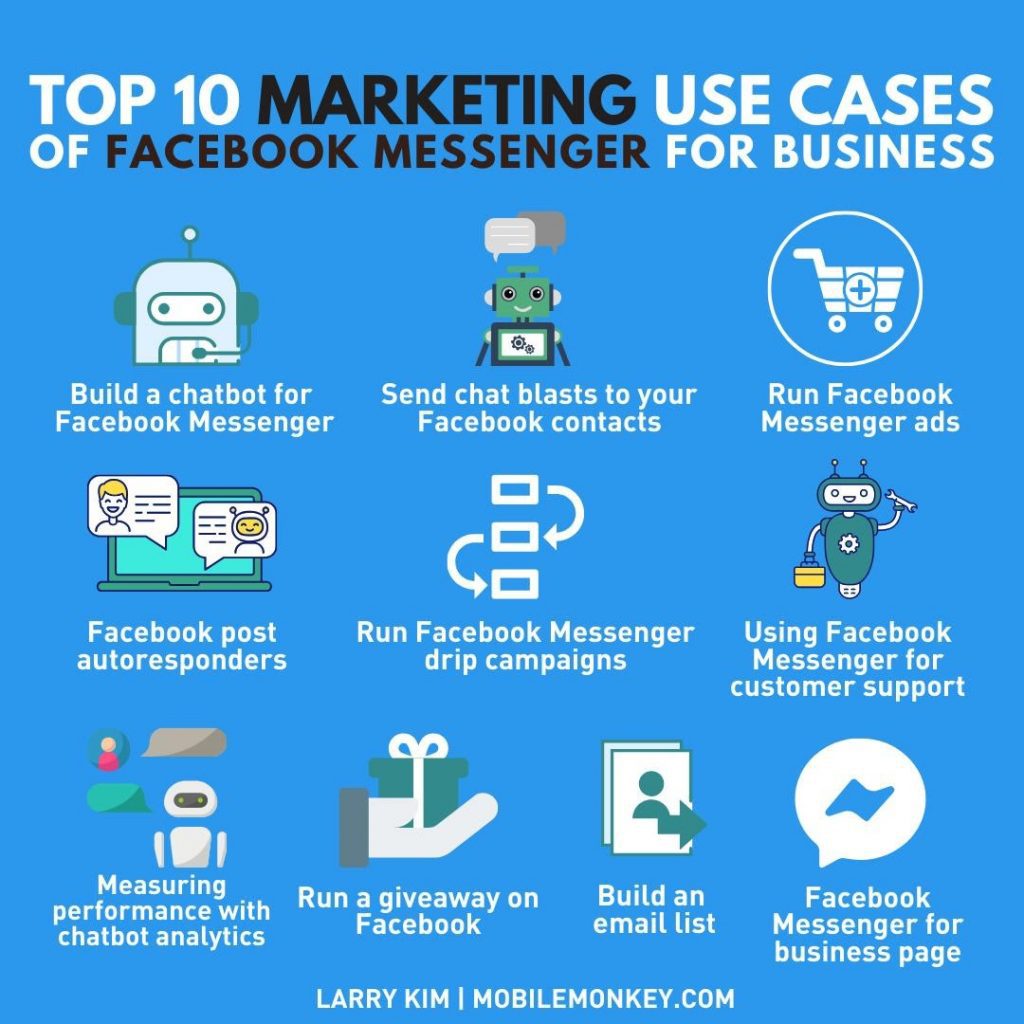
So, what are the most valuable things a Facebook Messenger chatbot can do?
- Build a chatbot for Facebook Messenger
- Send chat blasts to your Facebook contacts
- Run Facebook Messenger ads
- Facebook post autoresponders
- Run Facebook Messenger drip campaigns
- Using Facebook Messenger for customer support
- Measuring performance with bot analytics
- Run a giveaway on Facebook
- Get contact information from Facebook fans
- Messenger for Facebook Business Page
What is text message marketing?
Text messaging, or short message service (SMS), is used by every mobile phone user — regardless of where they live, the mobile device they own, and the technology they have on their phone.
And SMS marketing is increasingly popular, as made clear by the data and SMS marketing statistics such as these:
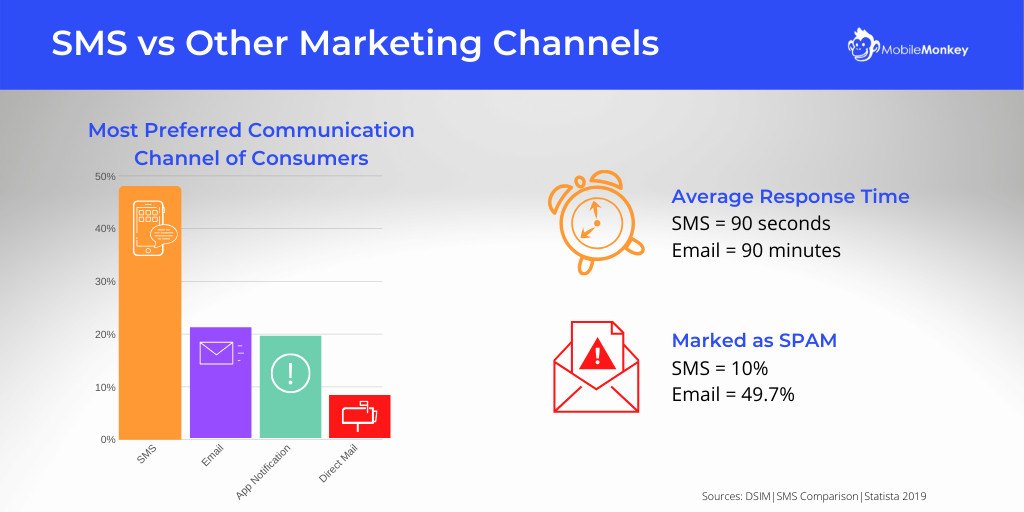
Here are 10 SMS marketing example campaigns:
- Welcome message. “Thanks for signing up for updates.”
- Sales and promos. “Take 20% off your order with code THANKYOU.”
- Event invitations. “Join us for a live webinar on 5/1 at 4 pm.”
- Status updates. “Valued client, we have updated our policies.”
- Lifestyle and community. “Everything’s going to be amazing.”
- Booking confirmations. “You’re booked! See you on 3/17/2020 at 3:00 pm.”
- Appointment reminders. “Your appointment is tomorrow, 3/17/2020, at 3:00 pm.”
- Billing reminders. “Your balance of $100 will be paid by card on 8/1/2020.”
- Security codes. “123456 is your verification code. It expires in 15 minutes.”
- Internal company updates. “Team, please be aware of building maintenance.”
For more text marketing examples, see this article with 10 instant SMS marketing examples to stay in touch with customers via text.
Chatbot examples
Chatbots have gone mainstream and many of the world’s largest companies have incorporated bots into their overall growth marketing strategy.
Take the following popular chatbot from Fandango for example. This bot informs you of all the latest movies, where to find showtimes, and even purchase tickets:
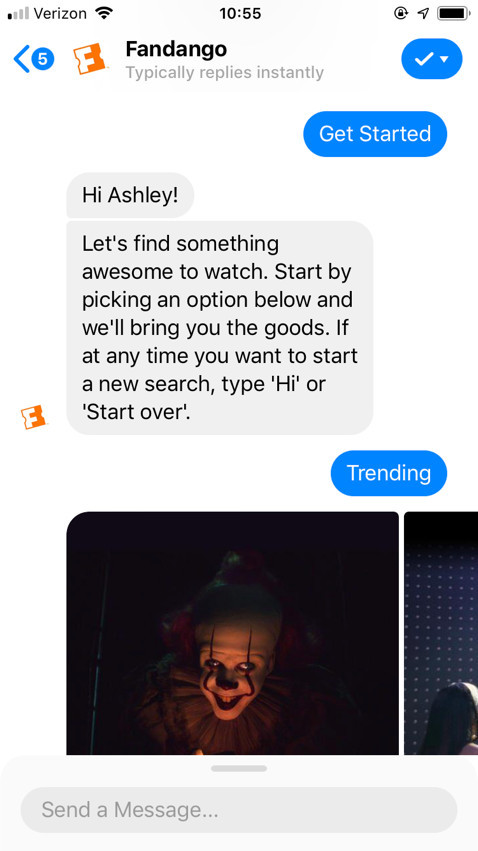
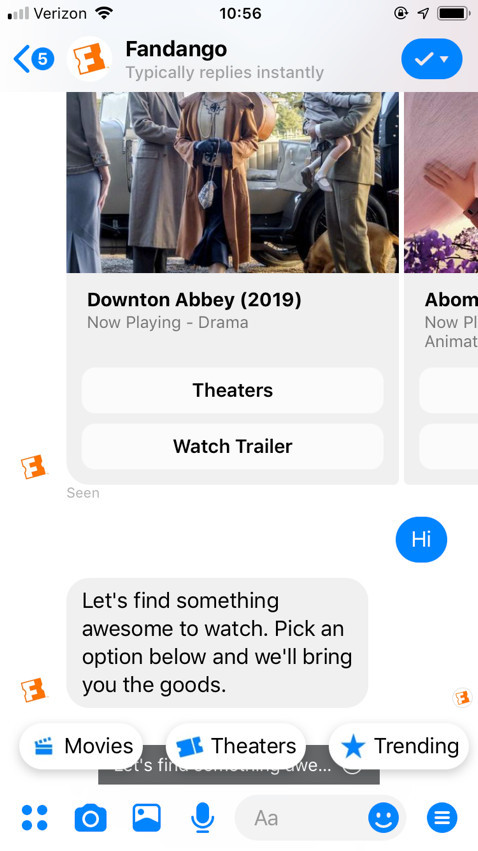
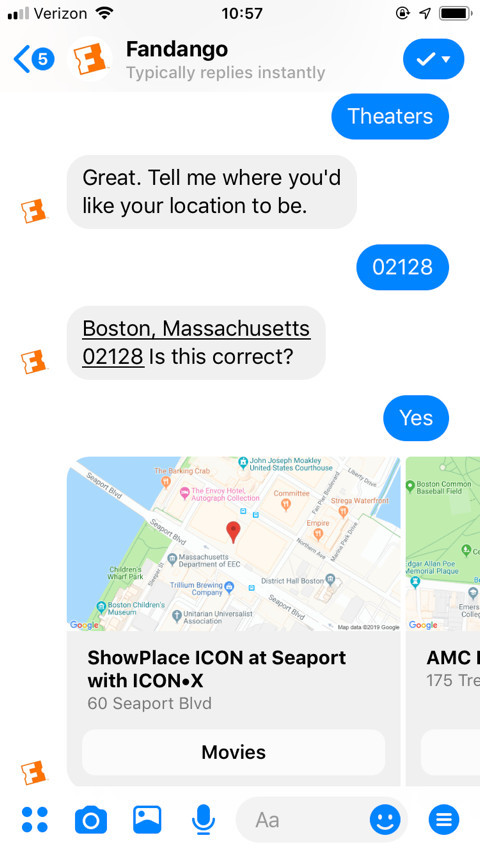
There are too many chatbot examples to cover in this article. However, here are 10 to start with, and if you want more, along with the details, check out these 17 successful chatbot examples to grow your business!
- Increase open rates by 3X with text message marketing bots.
- Create an interactive survey.
- Get prospects and customers to opt-in to messaging on other channels, such as SMS.
- Qualify and capture leads with live chat.
- Use menus and automated FAQs.
- Interactive mobile ads on Facebook.
- Increase sales by 5X using chatbots.
- Proactively engage with visitors on your website using live chat.
- Get more reviews with a bot.
- Increase ROAS (return on ad spend) using chatbots.
Here are seven more chat marketing tactics you can use today.
How To Build a Chatbot
So, how do you build a bot for business?
There are different chatbots for different channels. For this article, you’re about to learn how to add a chatbot to your website.
However, you can build a bot for other major marketing channels such as Messenger and SMS. And, if you use omnichannel chatbot software like Customers.ai, you can build them all on one platform.
How to build chatbots for Messenger and SMS
So, when you’re ready to build Messenger bots, Facebook live chat bots, or SMS text marketing bots, you can find those guides here:
- How to build an SMS bot in 10 minutes or less with zero coding experience.
- Add Facebook live chat to your website. Yes, you can do that. ????
- How to build a Facebook Messenger chatbot.
How to add live chat to your website
The most popular use case for chatbots is adding live chat to your website.
Here’s a great video, part of the Customers.ai tutorial series from Chatimize, that you can follow along with by creating a free Customers.ai account on how to add live chat to your website in just a few minutes:
Important Next Steps
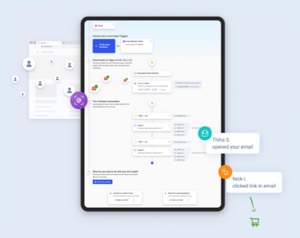
See Who Is On Your Site Right Now!
Get names, emails, phone numbers & more.
Try it Free, No Credit Card Required
